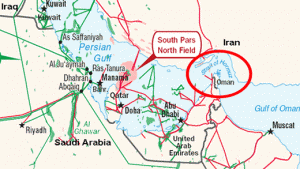 The American Petroleum Institute, along with Senator Lugar (R-IN), has grasped the recent threat of a crisis in the Strait of Hormuz as the perfect opportunity to peddle its misinformation about Keystone XL and U.S. energy security.
The American Petroleum Institute, along with Senator Lugar (R-IN), has grasped the recent threat of a crisis in the Strait of Hormuz as the perfect opportunity to peddle its misinformation about Keystone XL and U.S. energy security.
The Strait of Hormuz is a narrow channel of ocean between Iran and Oman through which some 17 million barrels of oil pass daily on route to world markets. Blocking it, as Iran has threatened to do, would send the price of oil soaring.
So the proponents of Canadian oil and the Keystone XL pipeline say that if Obama would just permit the pipeline the Iranian threat would be diminished. Nothing could be further from the truth.
Building the Keystone XL pipeline won’t make any difference to Iran nor will it protect the United States from the impact of a closed Hormuz, should it ever come to pass. This is because the pipeline would run to the U.S. Gulf Coast, an international refining center that has recently expanded in order to serve the global oil products market, and because oil prices are global not regional. The oil price spike that will result from a closure at Hormuz will raise American prices with or without Keystone XL (KXL).
Since 2001, the Gulf Coast has seen an expansion of refining capacity of some 1 million barrels per day. That’s double the amount KXL is planning on delivering to Texas. That does not include the massive 325,000 barrels per day expansion yet to be completed at the Motiva refinery in Port Arthur (a joint venture between Shell and Saudi Aramco), which is scheduled to come on line later this year.
The irony of the latest round of refining capacity additions is that they have occurred at the same time as a decline in U.S. oil demand. U.S. oil demand peaked in 2005 and President Obama’s latest round of vehicle efficiency standards cements the trend, ensuring a steady decline over the next two decades.
So are Gulf Coast refiners cutting their losses and shutting down refinery capacity that is no longer needed to meet U.S. fuel consumption. Not at all. The Gulf Coast is at the center of an unprecedented boom in U.S. petroleum product exports, which has broken records almost every month in the last 10. The U.S. now exports over 3 million barrels a day (Mbpd) of gasoline, diesel, jet fuel and petroleum coke and some 72%, over 2.2 Mbpd, comes out of the Gulf Coast.
What’s more, these refiners are increasingly configuring their refineries to produce the products that are in demand on the international market, primarily diesel.
Keystone XL will in fact bring a heavy sour grade of oil that is ideal for processing in cokers and hydrocrackers that can be configured to maximize diesel production. In fact the pipeline’s biggest customer, Valero, has specifically stated to investors that its Port Arthur refinery will be set up to convert Canadian heavy from the Keystone XL pipeline into diesel for the export market.
Because the Gulf Coast is now an international refining center not an American one, refiners there are serving a global market not U.S. domestic need. With the expanded capacity, Gulf Coast refiners will suck up Keystone XL oil and still import as much oil as they have always done from the Middle East, Venezuela and everywhere else.
So Keystone XL will not protect America from the vagaries of the global oil market and the threat that Iran or anyone else may place on the operation of that market. It is in fact a key piece in the infrastructure that links America to the global market.
Proponents that exploit the situation with Iran to line their pockets on the back of American consumers are doing this country a great disservice.
We need to understand that the vehicle efficiency standards, if they are properly implemented, will go a far longer way toward undermining Iran’s power than any pipeline from Canada ever will. But Senator Lugar and the American Petroleum Institute would have to praise rather than vilify President Obama to acknowledge that.

If there is supposed to be an energy shortage in the US, then, why are petroleum products being exported? With an over supply, why isn’t the price of petroleum products within the US decreasing? XL has nothing to do with energy independence.
The XL project will benefit Total, Valero, the Koch brothers and Shell and is not in the national interest and the public interest. Port Arthur, Texas is a Foreign Trade Zone, which means, free tax zone, which means, no taxes and custom duties for the oil industry.
The closing of the Straits by Iran is Big Oil disinformation. The API and Lugar are oil-bought. The Iranian military is not strong enough to close the Straits. The Iranian Air Force and Navy, together, are no match for one US aircraft carrier, with accompanying guided-missile cruisers and other escorts. It is not in the Iranian national interest to close the Straits, because this would block Iranian exports, including the exporting of oil to China and Japan. Iran is not going to strangle itself. The notion of the closure is a poor example of disinformation by Big Oil, Lugar and the API. There is no connection, whatsoever, between the Straits and XL.